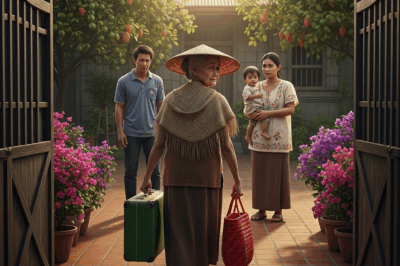
I held the bag in my hand, thinking it must be some money for me to spend on the way or to take back to my hometown. After all, I had cared for my grandchild and taken care of the house for eight years. If I had been a maid, I would have been paid. I never demanded anything, but I thought at least it would be some recognition.
I am a mother, a grandmother, like any other woman. At over 60 years old, I should have been enjoying peaceful days—sipping hot tea in the backyard, watching the trees, occasionally going to the market, chatting with old friends. But for the past eight years, I left my hometown and moved to the city to live with my daughter and her husband, so I could care for my granddaughter.
Eight years. It might sound like a short time to some, but to me, it was a whole chapter of my life.
That day, while I was cleaning the house, I received a call from my daughter. Her voice trembled:
– “Mom, my husband and I work all day. There’s no one to pick up little Nam from school, and we don’t even have time to cook. Could you come stay with us for a while?”
From the other end, I heard little Nam’s small voice:
– “Grandma, please come live with me…”
I dropped the rag in my hand as tears welled up. At that moment, I didn’t think much—I just knew I had to go. I quickly packed, carefully placing my late husband’s photo at the bottom of the suitcase, and caught the earliest bus to the city. I thought I’d only stay for a few months until things settled down. But in the end, I stayed… eight whole years.
Since that day, I never once had a morning to sleep in or a proper rest. Every dawn, before the sun rose, I was already up preparing breakfast, packing my granddaughter’s schoolbag, and waking my daughter and son-in-law for work. After dropping Nam at school, I would rush back to clean, wash, and tidy the house. Every meal I cooked always had soup and side dishes, because I knew my daughter and son-in-law were busy. I wanted them to come home to comfort, not more worries.
I always told myself that since I was living in their home, I should be considerate, careful, and never complain. When Nam entered first grade, I even took on tutoring her. My own education was limited, and many of her math problems baffled me. But I would quietly ask the neighbor who was a teacher, jot down notes, and then use them to help my granddaughter with her lessons at night.
There were nights when Nam had a high fever while both her parents were away on business trips. I carried her to the hospital in the middle of the night, sat by her bed without closing my eyes, wiping her sweat and checking her temperature hour by hour. She finally broke the fever near dawn, while I dozed off by the bed still holding a damp towel.
Sometimes, late at night, my back aching, unable to sleep, I sat on the balcony staring at the streetlights, missing my small yard back home, the guava tree in early summer, the crowing of roosters at dawn. But then I would turn back inside, returning to the endless cycle of chores.
To say I wasn’t sad would be a lie. I often felt lonely. On one birthday, I cooked for myself and quietly ate alone. My daughter and son-in-law only said one sentence:
– “Happy birthday, Mom.”
Then they went back to their laptops. I forced a smile, turned away, and hid my tears.
But I didn’t complain. I understood how busy they were. I didn’t want to become a burden. I only hoped that one day, when my granddaughter was older, I could finally return home and spend my last years with my memories.
That day finally came. This summer, little Nam was accepted into a boarding school in the city. On the day of enrollment, I watched her happily carry her backpack and run into the school gates, and suddenly my heart felt empty.
That night, I gathered my courage and told my daughter and her husband:
– “I think it’s time I return to the countryside. Nam will be at boarding school now, and there’s not much left for me to do here…”
My daughter looked at me in shock, her eyes turning red:
– “If you leave, who will take care of this house? But… if you’ve decided, I won’t stop you.”
The next morning, I packed my things. My granddaughter hugged my legs, crying:
– “Grandma, don’t go. I’ll come visit you every weekend, okay?”
I soothed her, promising to plant tomatoes back home so she could pick them when she visited. Just before the bus left, my son-in-law hurried up and slipped a small old fabric bag into my hand, whispering:
– “Mom, this is from us. Please keep it.”
I thought it was some money for the journey or to take home. After all, eight years of childcare and housework—if it had been outside, someone would have been paid. I didn’t demand it, but I thought at least it was a token of acknowledgment.
After a five-hour bus ride, I finally returned home. That night, after tidying up the house, I finally had time to open the bag my son-in-law had given me. To my surprise, there was no money inside—only a small paper pouch, filled with little notes and cards covered in writing.
With trembling hands, I picked up the first slip of paper. It was my granddaughter’s handwriting: “Grandma, your sweet-and-sour ribs are the best in the world!” The next one was from my daughter: “Mom, last year when you were sick, you still got up early to cook for us. Thank you so much, Mom.” Then there was a note from my son-in-law: “Mom, every time I had to travel, you secretly put motion sickness medicine in my bag. I knew. You’re the one who has kept this home together…”
I broke down in tears, soaking the papers with them. All the loneliness, hardship, and sacrifices—melted away in that moment. I realized I had never been forgotten. I was never invisible. Every moment I thought had passed unnoticed… they had remembered, with all their hearts.
Since returning home, every morning I take out that pouch of notes and read them. I tend to my tomato plants, watering and picking off pests, waiting for the day Nam will come and harvest them. Every time I open the pouch, I feel as if I’m back in that little kitchen in the city—cooking, hearing my granddaughter’s laughter, and my daughter’s voice saying: “Mom, dinner is so delicious!”
I finally understood—some kinds of love don’t need to be flashy, don’t need to be measured with money. They live in a warm meal, a gentle question, and in little slips of paper that may seem plain but carry a whole heart.
That small bag was the greatest gift of my life. It was recognition, love, and a response to the eight years I quietly devoted to my children and grandchild.
News
Naghiwalay kami. Inangkin ng ex-husband ko ang bahay sa pangunahing kalsada. Tinanggap ko ang wasak na bahay sa eskinita—ng araw na ipagigiba iyon, buong pamilya nila ay lumuhod sa lupa…/th
Ako si Hana, 34 taong gulang, dating asawa ni Eric—isang lalaking matagumpay, gwapo, at mahusay magsalita. Noong bagong kasal pa lang…
May sakit ang anak ko at kailangan ng pera. Pinuntahan ko ang dati kong asawa—itinapon niya ang isang punit na damit at pinalayas ako. Nang suriin ko iyon, nanigas ako sa nakita ko…/th
Ako si Lia, at halos dalawang taon na kaming hiwalay ni Daniel. Mabilis ang hiwalayan—walang luha, walang habol. Sumama siya sa bagong babae,…
Nang malaman ng biyenan ko na kumikita ako ng 50 milyon kada buwan, pilit niyang ipinauwi ang tatlong kapatid ng tiyuhin ng asawa ko mula sa bukid para tumira kasama namin—at inutusan akong pagsilbihan sila. Tahimik akong nagplano, at isang araw lang ang lumipas, may nangyaring hindi nila inasahan/th
Mula nang malaman ng biyenan ko na 50 milyon ang buwanang kita ko, biglang nagbago ang ugali niya.Wala nang panunumbat.Wala…
“Binuhusan ng asawa ang ulo ng kanyang misis ng bagoong para lang mapasaya ang keridang buntis daw ng anak na lalaki—ngunit hindi niya inakalang makalipas lamang ang sampung minuto, ang buong pamilya ng babae ang magpapakita ng isang matinding paghihiganti, na mag-iiwan sa kabit na walang kalaban-laban.”/th
Ang lalaking minsan kong tinawag na asawa—sa harap ko at ng babaeng kinakasama niya—ay biglang binuhat ang isang mangkok ng…
Namatay ang kuya kong may sakit sa pag-iisip — alam kong may naglason sa kanya…/TH
Ako si Andrea. Tanda ko pa noong 8 years old pa lang ako. Si Kuya Joel ay may sakit sa…
IKAKASAL NA KAMI BUKAS PERO BIGLA SIYANG NAWALA NA PARANG BULA/th
Ako si Joy. Bukas na sana ang kasal namin ni Marco. Nakaayos na ang lahat, ang simbahan, ang gown ko,…
End of content
No more pages to load












